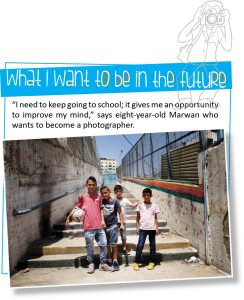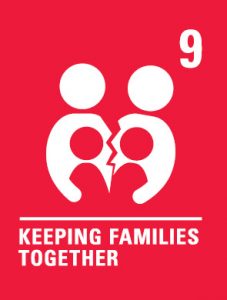 In the Palestinian context, and especially in the Gaza Strip and the West Bank’s Area C, water scarcity and lack of WASH (water, sanitation, and hygiene) infrastructures due to Israeli restrictions have directly led to the deterioration of basic living conditions. Vulnerable people and communities living in Gaza and the West Bank’s Area C are negatively impacted by the water crisis, resulting in conditions of poor health and sanitation.
In the Palestinian context, and especially in the Gaza Strip and the West Bank’s Area C, water scarcity and lack of WASH (water, sanitation, and hygiene) infrastructures due to Israeli restrictions have directly led to the deterioration of basic living conditions. Vulnerable people and communities living in Gaza and the West Bank’s Area C are negatively impacted by the water crisis, resulting in conditions of poor health and sanitation.
When aid workers evaluate the household’s general socio-economic conditions, the status of domestic and potable water-storage facilities, prevailing hygiene practices, and the prevalence of waterborne diseases, they pay specific attention to children. In fact, children are particularly affected by the deterioration of living conditions and are particularly vulnerable, as their bodies are more sensitive to waterborne and hygiene-related diseases such as diarrhea and intestinal worms.
To avoid childhood illness and potentially life-threatening conditions, numerous projects have been implemented over the years by a wide range of humanitarian and development actors in the occupied Palestinian territory (oPt) with the aim of supporting affected children and their families to benefit from safe and affordable water and sanitation, and improve hygiene practices.
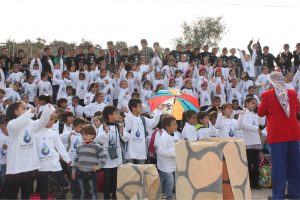
Some partners, for example, assist in installing or rehabilitating household sanitation facilities (e.g., WC, kitchen and toilet sinks, and water mixers) and connect households in unserved areas to the nearest wastewater network system. To guarantee safe access to sanitation services, clean water, basic toilets, and good hygiene practices are essential for children’s survival and development.
Activities such as the provision of water cisterns, the rehabilitation of water networks, latrines, and school WASH facilities are often carried out in parallel with soft-component interventions, such as awareness-raising campaigns and training, which aim to improve people’s knowledge of water issues and good hygiene practices.
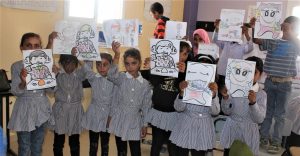
Action Against Hunger has implemented hygiene-awareness campaigns and workshops both at household and community levels to promote key messages concerning safe water handling and storage, safe drainage of wastewater, and good personal hygiene practices. To protect children from unsafe water, communities and schools are often provided with awareness-raising materials on waterborne health risks and household water management. This also includes street billboards, posters, brochures, responsibility calendars, informative stickers, and follow-up sheets to facilitate planned actions with family members, including boys and girls. In addition, in order to creatively engage people and increase the community and children’s participation, theater shows, environmental clubs, and summer camps have been also organized during the last few years.
WASH interventions in vulnerable communities in the oPt have greatly improved basic living conditions for children and their families. When access to drinkable water and appropriate household sanitation facilities are ensured, children and their families have more hygienic shelter surroundings. Due to the availability of flushing water and handwashing facilities, the levels of water consumption increase, and hygiene practices improve.
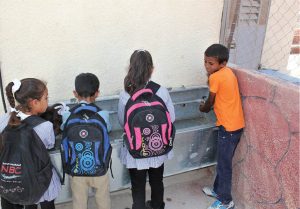
At school, girls and boys have WASH facilities at their disposal. They are also encouraged to participate in awareness-raising activities to improve their knowledge and attitudes regarding good water use and hygiene practices.
Water availability reduces family expenditures related to water by almost half, and households usually reallocate their savings to benefit children’s health, education, and recreation.
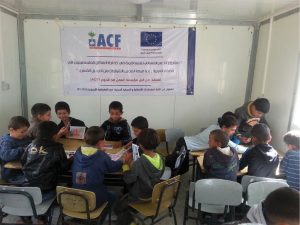
al-Butum School – Hebron. Photo by Nesreen Al-Hafeth.
Success Story: Awareness-raising campaigns in Jaba’a Tajamu’ Badawi (Action Against Hunger)
Jaba’a Tajamu’ Badawi community is located in Area C, not too far from East Jerusalem. In order to increase access to safe and affordable water and sanitation, Action Against Hunger has rehabilitated the existing water network and provided households that were lacking sanitation services with water tanks and mobile latrines. In addition, a mixed primary school with WASH facilities has also been constructed for the children of the community. After the school was built, it became apparent that the students had poor hygiene practices and, as a result, a hygiene-awareness campaign was organized to improve the water-use and hygiene practices of children, parents, and school staff. Within the framework of this campaign, several sessions and practical demonstrations were carried out, and fun activities targeting both students and their mothers were organized. During the sessions, hygiene kits containing soap, cleaning solutions, disinfectants, a cleaning brush, and toilet paper were distributed to all participants, and children learned various good hygiene practices related to washing their hands after using latrines, bathing, hair cleaning, and tooth brushing. Thanks to the systematic and continuous follow up done by school staff, a great improvement was noticed in terms of knowledge of good personal hygiene practices.
In the words of Mohammad Ka’abneh, nine years old: “Now I always bring soap bars in my school bag to wash my hands before and after eating, and after I use the WC. I feel that this is important for my health to avoid diseases.”
